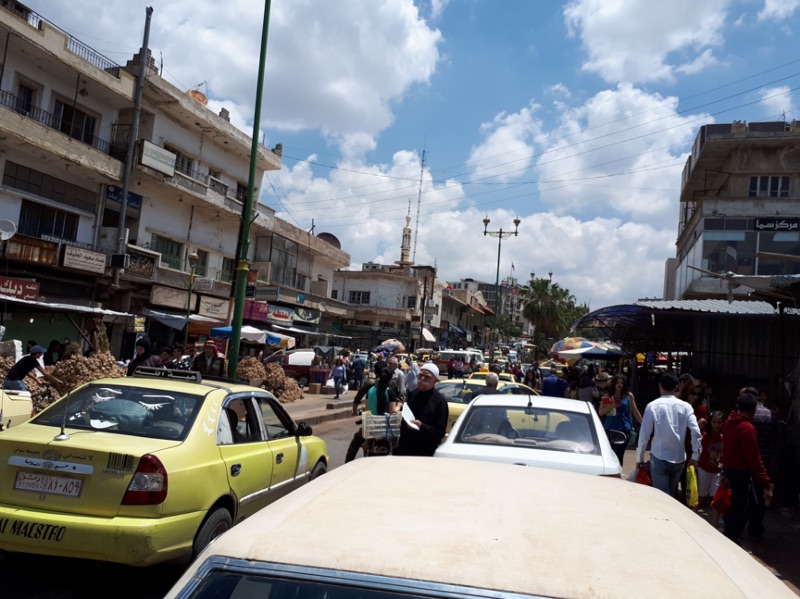Lawlessness and Crime: Al-Suwayda Contends with Secondary Effects of the Syrian Conflict
Ethnic and religious solidarity have kept al-Suwayda province in southern Syria safe from the worst of the civil war’s destruction (for more on this, see the first part of Navanti’s al-Suwayda series here). A majority of the province’s residents are Druze, an esoteric religion with roughly one million adherents worldwide. These residents have buried their political differences in favor of maintaining social cohesion and stability, and as a result, al-Suwayda has witnessed only rare instances of armed combat over the past seven years.

Al-Suwayda city market. Source: Navanti Group
But the war has found its way into the area by other means. Navanti researchers visited al-Suwayda this year to explore the security challenges residents face as they struggle to make ends meet.
Lawlessness and Crime
Al-Suwayda residents took an early stand against mandatory conscription into the Syrian Arab army and other perceived abuses carried out by Damascus, even as they avoided allying with rebels. The Syrian government responded by adopting a hands-off approach to governing the province, maintaining municipal services and a nominal military presence but leaving locals to provide much of their own security. This strategy kept the Druze population under government control, bolstering Damascus’s claim that it has the support of minority groups while allowing it to concentrate military resources elsewhere.

Provincial headquarters building in al-Suwayda city. Source: Navanti Group
But a lack of organized security led to predictable results: the spread of crime and lawlessness. Robbery in al-Suwayda is rampant. Kidnappings for ransom are a near daily occurrence, as documented by the local news organization al-Suwayda 24: the channel counted 37 instances of kidnapping for ransom, or forced disappearances, in March 2018 alone.
“The government dealt with al-Suwayda province differently from the other Syrian provinces because it is the homeland of the Druze minority. It’s well known that the government avoided conflicts in areas with minorities since the beginning of the war. But the absence of authorities who are charged with implementing the law created an unprecedented state of lawlessness in al-Suwayda. Murder, kidnappings, and theft are commonplace all across the province.” Journalist, al-Suwayda city
A patchwork of armed militia groups administers security in al-Suwayda, including those under the umbrella of the loyalist National Defence Forces. Checkpoints operated by these groups only search cars from outside the province, so as to avoid causing trouble with residents. But this approach allows local criminals space to operate. In addition, some checkpoints accept bribes, or engage in other unscrupulous behavior, leading to the perception that members are involved in the very crimes they are supposed to prevent.
These armed groups have gone rogue, and members participate in disturbing security through kidnapping, banditry, or setting up checkpoints and extorting people. As long as they are around, there will continue to be a sense of lawlessness…we’re now afraid to leave our houses at night. We’re afraid for our jobs — if someone steals our property, these groups will not help us get it back.” Teacher, al-Suwayda city
The Syrian police maintain patrols and stations around al-Suwayda city, pursuing criminals and contributing to a sense of order and safety.

Al-Suwayda city market. Source: Navanti Group
But residents report that police in the countryside are unable or unwilling to bring dangerous lawbreakers to justice, likely because they fear for their own safety.
“Around two months ago I was the victim of a kidnapping attempt by an armed group, which is well known to everyone in my area. I escaped, miraculously. But I suffered health problems because the kidnappers hit me while trying to abduct me. What upset me more than the beating was the fact that when I complained to the police, they didn’t do anything, although everyone knows who this gang is — they pass by every day in front of the police station. My case isn’t unique. The police rarely try to pursue justice for anyone, they’re incapable and soft in a way we’ve never seen before. This leads to an increase in crime…we’ve started to feel like we’re living in a jungle.” University student, Shahba
Making matters worse, ISIS has a presence in the province’s eastern desert and poses a persistent threat to residents. Respondents report that ISIS periodically sets up mobile checkpoints to search passerby, kidnapping or summarily executing anyone suspected of loyalty to the opposition or government. Intermittent clashes occur between the extremist organization and local Druze or Bedouin militias.
“The most dangerous checkpoints are the temporary ones that ISIS sets up on different roads in the desert…they conduct field executions. The most recent incident happened a week ago when they executed three people from the Damascus countryside who were heading from the Rukban camp towards al-Suwayda — ISIS accused them of being loyal to the rebels.” Journalist, al-Suwayda city
Despite seemingly monumental security challenges, al-Suwayda residents have held on to their hard-won stability and refuse to involve themselves in Syria’s ongoing war. Time will tell whether the province stays clear of widespread fighting as the Syrian government considers a military campaign to root out remaining rebels in the country’s south.

Street scene in Shahba, al-Suwayda. Source: Navanti Group

